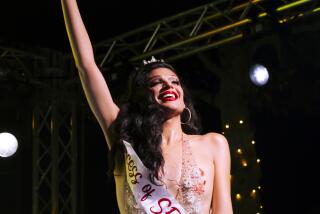Students Let Out a Cheer Fit for Royalty : Union Avenue: Princess Alexandra of Great Britain visits the downtown elementary school to learn about the DARE drug program.
- Share via
Just inside the front door of Union Avenue Elementary School near downtown Los Angeles is a recruiting poster. “Join a gang where you’ll learn to use knives, ropes and clubs,” it says. “Today’s Boy Scouts. One great gang.”
The Scouts also learn to use drums and bugles, and the instruments were put to work Tuesday as the crowded school where English is a second language offered a little pomp, circumstance and quiet dissent in greeting some unlikely visitors who arrived by Rolls-Royce.
Princess Alexandra of Great Britain, who is the first cousin of Queen Elizabeth, had come for a brief review of the city’s heralded anti-drug abuse education program, known as DARE (Drug Abuse Resistance Education).
British officials, looking for answers to their drug problem, are studying the DARE model, in which uniformed police officers go to the classroom to teach students how to avoid the temptation of narcotics.
Princess Alexandra, little known in America but considered in Britain as one of the most friendly and popular of the Royal Family, was cheered by hundreds of students, even if a few wondered why she was not wearing a crown.
Students offered her flowers. Mayor Tom Bradley presented her with a key to the city. Police Chief Daryl F. Gates presented the princess and her husband, Sir Angus Ogilvy, with black DARE jackets.
The welcome for Princess Alexandra’s party was not unanimous. Third-grade teacher Maria Elizabeth Munoz, who happens to be the Peace and Freedom Party candidate for governor, wore a green armband in a show of solidarity with protesters against England’s policies in Northern Ireland.
“They spend all the money for this,” Munoz said, pointing at balloons and a sound system set up for the princess’s arrival. “It’s one big day for the princess, but I think our kids are important. Some of us teachers aren’t too happy about this.”
Munoz had earlier issued a press release in which she spoke of the repression of Catholics in Northern Ireland. “As a Chicana, I know what it is like to live in my native country as a second-class citizen while colonists live lives of privilege and affluence.”
During the one-hour visit, the couple were briefed on the program by Gates in the school library. The DARE curriculum, founded in Los Angeles, is being taught to 4.5 million students in all 50 states and to U.S. military dependents abroad.
Ogilvy, who was taking notes, asked: “How do you export it to a foreign country?” When Gates mentioned that he had already discussed DARE with Peter Imbert, commissioner of the London Metropolitan Police, Ogilvy seemed delighted.
“He comes and rides in our stables,’ Ogilvy told Gates, “so we’ll put pressure on him.”
Next stop was a classroom where DARE Officer Merci Fernandez led a group of fifth-graders through skits in which they practice ways to reject offers of drugs. When one girl said “Nawww” and slowly walked away from an imaginary drug pusher, her classmates admonished her to say “No!” and move quickly.
Ogilvy asked if any of the children, at their age, had been offered drugs. No, they said. What about older brothers and sisters? Yes, they replied.
Soon, the royals had to hustle off. But as the Rolls waited, Princess Alexandra stopped to greet several neighborhood residents who stood by waiting with their children. She shook hands, accepted a kiss from a little girl and posed while her husband snapped photos like a tourist.
If Munoz was skeptical, royalty still seemed magical for Maria Rubio, a 32-year-old mother of five. She was enthralled.
“We are not supposed to have this privilege,” Rubio said. “Where people are, it does not matter to her. . . . Oh, I’m so poor. She is not so.”
She gestured upward, struggling for a word.
More to Read
Sign up for Essential California
The most important California stories and recommendations in your inbox every morning.
You may occasionally receive promotional content from the Los Angeles Times.












